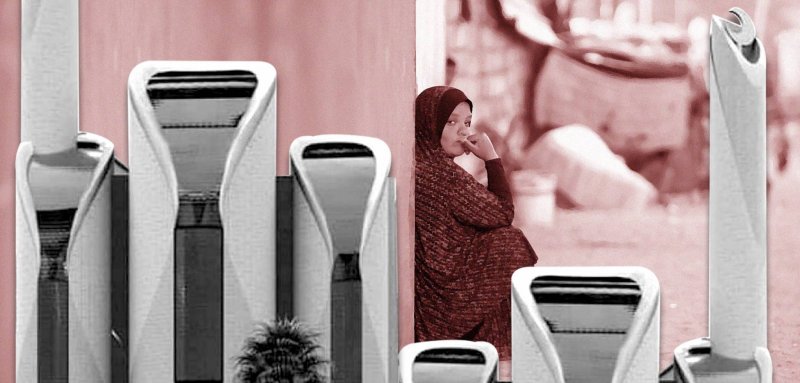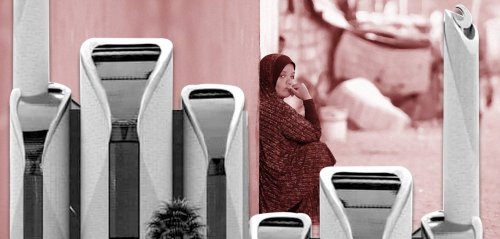You cannot begin a casual conversation with anyone you encounter in Gaza –whether it is a taxi driver, a vendor, or a friend – without being intercepted by the question: Have you heard the plans for the new mosque?
During the past 72 hours, the announcement of the reconstruction project for the “Khalil al-Wazir Mosque” in the Sheikh Ijlin area, south of Gaza City, was at the heart of discussions that were full of sarcasm. It all started after the Ministry of Religious Affairs in Gaza revealed that, in cooperation with the Ministry of Public Works and Housing, it would rebuild the Al-Wazir Mosque that Israel had destroyed in the 2014 war, at a cost exceeding one million dollars.
A Decade of Devastation and Strange Contradictions
In the last decade, conditions in Gaza deteriorated rapidly. In ten years, the people of Gaza experienced various forms of pain and suffering, the causes of which range from the Israeli blockade imposed since 2006, to the harsh and frequent Israeli wars, military escalation that continues to occur regularly, leaving behind great material and human losses.
The result of this systematic onslaught was a devastation that affected all aspects of life. In light of all these harsh transitions imposed on the people of the Gaza Strip, the phenomenon of building mosques in general – and luxurious ones in particular - began, until “the mosques have become palaces, nestled between tin houses” as young man Nour Abu Labdeh, 24, describes them.
Nour went on to say: “Other than their large number – for you can find three to four mosques per kilometer –you will notice that the same area, at best, is in urgent need of the restoration of its homes or providing a purification plant for drinking water, but why?” He goes on to say:
“You can also wander around the camps and areas of Gaza, and observe the radical contradiction between the appearance of the mosques and the state of the environment in which they are located. In our region north of the Strip, for example,” the young man says, continuing, “You will find that the mosques are decorated in such a manner that the most appropriate description for them is how they are alien to the environment in which they stand.”
According to the young man, this phenomenon has generated within the souls of many Gazans something much like an estrangement with these mosques – and the situation has even grown into resentment – especially with the increase in the phenomenon of building luxury mosques in Gaza during past years, and the continued inability of people to restore their homes as well as their worsening living conditions.”
According to the Deputy Minister at the Ministry of Public Works & Housing in the Gaza Strip Naji Sarhan, there are 12,000 housing units that need reconstruction after they were destroyed during the 2014 Israeli aggression on Gaza, at a cost of 50 million dollars. He says this is in addition to the need for 100 million dollars to repair houses with partial damages. Sarhan also notes that the ministry is facing a major problem in light of “donor parties withholding funds.”
Why Protest?
At a time when homes are collapsing in light of deteriorating living and economic conditions for more than two million residents of the Strip, this growing phenomenon of mosque construction was the main driver of recent controversy over this latest project in Gaza.
More than 80% of the residents of the Gaza Strip live below the poverty line, while the unemployment rate among the youth has reached 70%. This all comes in addition to the fact that the Gaza economy has been recently affected by the CoronaVirus, and has suffered losses of more than one billion dollars due to the lockdown imposed in order to fight the pandemic in August 2020, according to Ali al-Hayek, head of the Palestinian Businessmen Association in Gaza.
In view of the state of engagement with this issue, Yunus Al-Madhoun, 32, points out that, “It is not possible to exceed the living conditions of the residents of Gaza, with the priorities that this poses to the responsible bodies, as well as view projects to rebuild mosques worth millions of dollars as development projects, in light of a situation where people are living in a state of want for operational projects and other important projects of subsistence and productive sectors.”
Despite the devastation affecting all economic and living standards in Gaza and the harsh living conditions, the phenomenon of building mosques – luxurious ones – is remarkable and questionable.
“For example, how much would it cost to establish small projects to support a portion of the financially destitute families and youth?” Yunus wonders aloud adding that “I am sure it will not exceed one million dollars. Enough with comparisons, let’s just say: allocate the project funds for the benefit of supporting the youth and families in need.”
Despite the ongoing uproar, others found that the project did not deserve all this criticism, as its cost would eventually flow into the pockets of the workers, as Abdulmuta’ali Shuhaiber says, “Given the cost of construction, and the local company that took on this task, wouldn't the amount be divided between the workers and the company, and concrete and stone companies? This counts as support for workers’ pockets, or is it not?”
Restoring Slums Will Bring Us Closer to God
“Forget all of Gaza’s problems,” says 27-year-old young Ahmed Fatiha “There is an area located in the southwest of Khan Yunis, south of the Gaza Strip, called ‘Nahr al-Bared’. It is inhabited by about 500 people that live in dilapidated houses, without sewage networks or water and surrounded by mountains of rubbish. Is this area not worthy of restoring?”
He continues, “The development of this unorganized region, in addition to about 28 unorganized areas in Gaza, brings you closer to God as well. Do donor and relief organizations not find it a gateway to attain God’s approval, or is it only through ornamented mosques in the midst of a wasteland that this is achieved?”
Walk through Gaza and see the contradiction between the mosques and the their surrounding…the most fitting description is the mosques are alien to the place they’re built for.
According to Fatiha, a resident of a region near Nahr al-Bared, the residents of the area are suffering from difficult conditions, as their situation worsened and they found themselves living near mountains of garbage – in complete poverty and helplessness – and there is real evasion from addressing the crisis in these areas.
The Funder’s Wish, or the Wish of Those Requesting the Funding?
In its response to the ongoing controversy regarding the project, the Ministry of Awqaf and Religious Affairs in the Gaza Strip said that the Malaysian charitable association “Aman Palestin” was the one that stipulated that the donated amount be exclusively allocated for the construction of a mosque. According to the ministry, it does not hold a position opposing the wishes of the funder, especially since the reconstruction of mosques is its mission as well.
It added in a statement, “The Israeli occupation has demolished 110 mosques during its various onslaughts on the Gaza Strip. As the official body responsible for mosques, the Ministry of Awqaf and Religious Affairs is keen and is exerting great efforts in communicating with good people in order to provide the necessary funding for the reconstruction of mosques. The ministry was able to rebuild 94 mosques, by the grace of God, and then through the efforts of the charitable organizations and civil reconstruction committees. We are still making efforts in order to build what remains: 16 completely-destroyed mosques.”
On the other hand, representative of the charitable Organization of the Islamic Cooperation in the Gaza Strip, Mohammad Hasna responded to the ministry's statement and said that in 2018 – during the reign of the Undersecretary of the Ministry of Awqaf and Religious Affairs Hassan al-Saifi – a memorandum of understanding was signed between the Aman Palestine Foundation and the Ministry. The memorandum to build the Khalil al-Wazir Mosque with costs amounting to $ 950,000 came under heavy criticism and revisions, especially with the existence of a clear decision in Gaza’s official authorities to not market for or request any funding for the building of mosques, and “the Ministry justified it as being based on the request of the donor.”
He added, “I personally reviewed relevant parties, and the 'Aman Palestine' association confirmed through them that the mosque project was adopted based on the desire and recommendation of 'Gaza', which means that there are those who violated a collective desire and single-handedly exercised their influence in favor of a particular region, or in favor of a personal agendas that I do not know of.”
According to Abu Hasna, “The poor and the needy were really affected by the direction that charitable organizations, including ‘Aman Palestine’, have taken towards rebuilding mosques. The foundation's staff in Malaysia and Indonesia were exhausted by the process of collecting donations for great mosques in Gaza.” He then goes on to point out that, “What happened was a waste of public donation money and accountability must reach the decision-maker who imposed his personal vision and the institution entrusted by individual donors. I repeat that it was not the wishes of the donor, it was a request from a party in Gaza.”
He mentioned that, “Since 2011, I have been visiting Malaysia and Indonesia and have participated in dozens of programs and campaigns to collect donations, and have seen how donations are collected and the generosity of the poorest people of those countries. That is why I feel the weight of the responsibility for spending this money.”
He concluded, “There are those who borrowed and became indebted in order to support Gaza, so yes, I get extremely angry when I hear about the waste of popular donations and people’s contributions in mosques.”
Raseef22 is a not for profit entity. Our focus is on quality journalism. Every contribution to the NasRaseef membership goes directly towards journalism production. We stand independent, not accepting corporate sponsorships, sponsored content or political funding.




